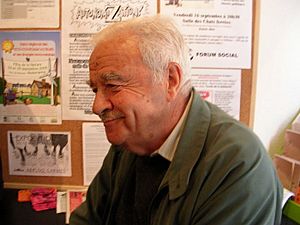Maurice Rajsfus facts for kids
Quick facts for kids
Maurice Rajsfus
|
|
|---|---|

Maurice Rajsfus in 2005
|
|
| Born | 9 April 1928 |
| Died | 13 June 2020 (aged 92) |
| Occupation | Historian Journalist & Controversialist Writer |
Maurice Rajsfus (born April 9, 1928, died June 13, 2020) was a French writer, journalist, and historian. He was also an activist who spoke out against unfair systems. He wrote many books about important topics. These included the terrible events of the Jewish genocide in France, the role of the police, and protecting people's freedoms.
In 1994, he helped start a group called the "Observatory of Public Liberties." He was in charge of this group, which worked to watch over and protect people's rights.
Contents
Maurice Rajsfus: His Life Story
Early Years and a Difficult Time
Maurice Rajsfus was born in Aubervilliers, a town just north of Paris, France. His parents were Polish Jewish immigrants. They had moved to France in the early 1920s.
A very important and sad event happened to Maurice when he was 14 years old, in July 1942. This event is known as the Vel' d'Hiv Roundup. During this time, French police and officials gathered over 13,000 Jewish people in and around Paris. They were held in terrible conditions at a sports stadium called a velodrome. From there, they were sent to the Auschwitz concentration camp, a place where many people were killed.
Maurice, his older sister Jenny, and his parents were all taken during this roundup. However, at the last moment, French Jewish children between 14 and 16 years old were released. Maurice and Jenny were among them. They never saw their parents again.
Many years later, in 1988, Maurice tried to talk to one of the policemen who had arrested his family. He wanted to understand what happened. But the policeman did not want to discuss it. Maurice often spoke about this brief meeting. He said that the police from that time, known as the "Vichy police," seemed to have "no regret and no memory" of their actions.
After the War and Activism
Right after World War II, Maurice joined a group called the Young Communists. But he was expelled two years later, in 1946. He then became involved with other groups that wanted to change society.
From 1991 to 1999, he was the president of a group called "Ras l'front." This group strongly opposed the National Front, a political party in France.
Starting the "Observatory of Public Liberties"
In 1993, a young man named Makomé M'Bowolé was killed while being questioned by police. One year after this sad event, Maurice Rajsfus helped create the "Observatory of Public Liberties."
This group publishes a monthly newsletter called "Que fait la police?" which means "What are the police doing?" This newsletter reports on incidents where police violence is believed to have occurred.
Maurice felt a strong connection between the past and the present, especially when it came to watching the police. He often said, "They stole years of life from my parents." He believed that if the French police had not followed certain orders during the war, much of the harm would not have happened. He noted that 250,000 people were sent away from France, including 76,000 Jewish people.
Views on Zionism
Maurice Rajsfus also shared his thoughts on Zionism. He saw it as a plan that was meant to help Jewish people avoid persecution. However, he believed it "quickly turned into a similar racist effort."
He also spoke out against using the accusation of antisemitism (hatred of Jewish people) as a weapon. He felt it was sometimes used against anyone who disagreed with Zionism.
In 1990, he wrote two books: "Palestine: Chronicle of Current Events" and "The Enemy within: Israel-Palestine." In these books, he described Israel as a "democracy under close watch." He also criticized some actions by the Israeli military.
His Education Journey
Maurice left school when he was 14 during the war, so he didn't have a regular high school education. However, he still earned a doctorate degree in Sociology in 1992.
He was also a judge several times for the Big Brother Awards in France. These awards highlight groups or governments that threaten people's privacy. He also wrote the introduction for a book about these awards. Even though he wasn't a "professional historian" in the traditional sense, his work was very important to understanding history.
 | Delilah Pierce |
 | Gordon Parks |
 | Augusta Savage |
 | Charles Ethan Porter |

